JEE Bible: 10 steps to clear JEE by Toppers (ranked under 100) | Mock Tests for JEE Main and Advanced 2026 PDF Download
| Table of contents |

|
| How was this guide made for JEE aspirants? |

|
| Why did EduRev make this guide? |

|
| Step by Step Preparation Strategy for JEE Exam |

|
| JEE Preparation Material |

|
Embark on Your JEE Journey with Confidence!
Congratulations! You've taken the first step toward your dream of entering India's top engineering colleges. But wondering where to start and how to prepare for JEE? Don’t worry, this guide is here to answer all your questions!

How was this guide made for JEE aspirants?
- This guide has been made by EduRev experts by analysing the strategies and interviews of JEE toppers such as Ved Lahoti (AIR 1 in JEE advanced 2024), V Chidvilas Reddy (AIR 1 in JEE advanced 2023), Mridul Agarwal (AIR 1 in JEE advance 2021 and 100 percentile in JEE Main 2021), Amaiya Singhal (100 percentile in JEE Main 2021), Siddhant Mukerjee (100 percentile in JEE Main 2021) and Anmol Arichwal (100 percentile in JEE Main 2021).
- The experts at EduRev have done an in-depth analysis of the study patterns, strategies and tips followed by the toppers of JEE to bring this comprehensive guide for you so that you have all the information required to prepare for JEE.
Why did EduRev make this guide?
- How many times have you started something but could not do it because of a lack of proper guidance? The same happens with many students who give up on their dreams due to a lack of direction.
- Students also waste a large amount of time, effort, and money while preparing for JEE just because they are looking for the right guidance. Therefore we wanted to help all those students and answer the question "How to Prepare for JEE" once and for all in the best / perfect way possible.
- This guide was made to teach in a guided way so that you can clear your JEE exam with the least amount of time, effort, and money spent, by just making sure you Study What Actually Matters for the preparation for the exam. We believe it will be very valuable for aspirants like you.
Step by Step Preparation Strategy for JEE Exam
Let’s have a look at the foolproof STEP by STEP preparation strategy for preparing for the JEE Examination at home.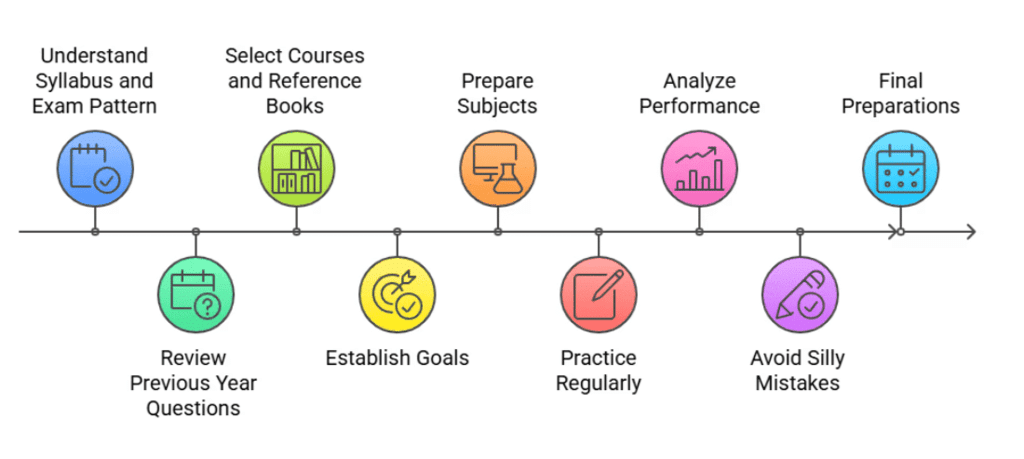 Step by Step Preparation Strategy to Clear JEE Exam
Step by Step Preparation Strategy to Clear JEE Exam
Step 1: Understand the Syllabus and Exam Pattern
- Before you start preparing, knowing what you have to study is the first step. Understanding the syllabus and exam pattern correctly will guide you to properly plan your preparation.
- If you are aware of the amount of syllabus to be covered you can prepare a proper timetable to cover all the topics.
You can check out the whole syllabus for JEE here.
- Understanding the exam pattern will keep you focused throughout your preparation as to the amount and type of questions you have to attempt in 3 hours.
- Section A of the JEE exam consists of 20 questions from each subject and Section B now requires candidates to attempt all 5 numerical questions per subject, with negative marking (-1 for incorrect answers, +4 for correct answers).
- Understanding dates and timelines are critical for you to plan your timetable and strategy.
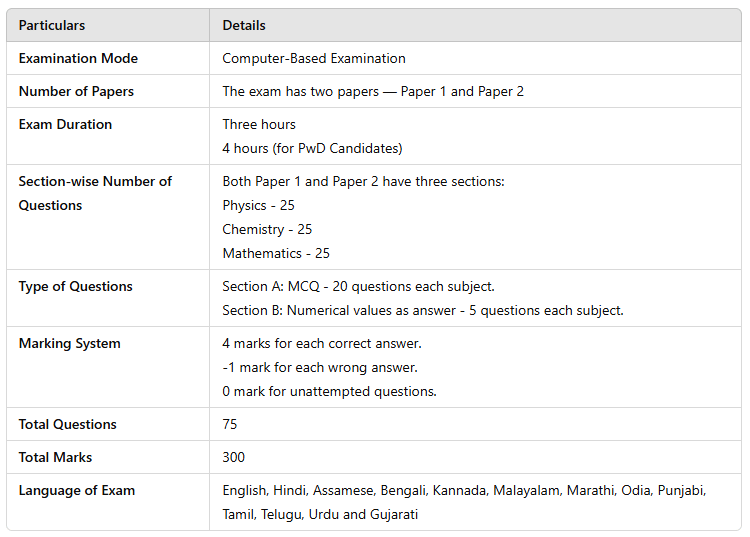
EduRev has compiled IIT JEE Syllabus, Pattern, and Scheme of Examination in this document.
Step 2: Understand the Previous Year Questions(PYQs) & important topics through them.

- Once you’re through the syllabus, pick up the previous year's papers and skim through them to get an understanding of what is actually asked in the JEE Exam.
- Attempt a few previous year's question papers to know your weak and strong points. For example, you get to know the ratio of numerical and conceptual questions and you can plan your preparation accordingly. Also, check the weightage of various chapters/topics so that you can focus more important chapters with high weightage.
EduRev has compiled question papers for Past Years, check them out here.
- If you are starting early, cover difficult and scoring topics first and then study the easier topics. If you are on a deadline, cover the easier and scoring topics first.
Step 3: Select the Right Course and Reference Books
Selecting the right course from the start is very important as it will shape your preparation. Select a course that provides you with all the necessary study material so that you don’t have to waste time searching for things.
Find a course that provides an explanation of the topics along with practice problems.
- A course that has Revision Notes, Formula Sheets, PPT's, Mind-maps for class 11 and Mind-maps for class 12, Previous Year Questions, Mock tests and solutions to reference books is all you need.
Have confidence in the course selected and stick to it. If you keep on switching courses, it will lead to confusion.
Reference books should be kept limited to avoid stress and confusion.
You must check out the course for preparation for the JEE exam on EduRev. It has videos, documents, and notes to help you understand the concepts along with lots of practice problems.
The link for the mind- maps is available here and for revision notes, check this link.
Step 4: Establish a Goal and Actively Strive to Achieve it
You have already selected your preferred course and reference books. You have also understood the syllabus and the exam pattern and now, you are ready to start studying. Directly jumping into the preparation without a plan will cost you double the effort. Therefore, it is important to have a plan and a set timetable to optimise your preparation.
Make a timetable so that you have sufficient time to learn all the concepts and practice them. EduRev provides time-table and chapter-wise study plans to keep you on track. Check out the complete study plans here.
Divide time in such a way that you are able to cover all the subjects.
Always set aside a few hours for revision.
Stick to the timetable to ensure self-discipline.
The sleep timings should be adequate. Reducing sleep will only reduce your productivity.
Step 5: Prepare for Mathematics, Physics, and Chemistry productively
 JEE exam has 3 subjects:
JEE exam has 3 subjects:
a) Physics
b) Chemistry
c) Mathematics
The strategy required to prepare for these subjects vary from one another and it can be confusing at times how to start preparing for them. EduRev has provided all the necessary tips required to ace these subjects.
Let us look at the subject-wise approach to prepare for JEE:
Step 5.1: How to Prepare for Physics?
EduRev provides complete chapter notes, quality videos, tests, revision notes and so much more on its course Physics for JEE.
- Concepts are important to understand: The first and foremost step in preparing for Physics is to understand the concepts, derivations and applications properly. Clarity of concept is required to attempt both conceptual and numerical problems. While learning about concepts proper notes should be made. EduRev provides notes in every chapter, which you can check here. You can also make side notes by yourself as you are more aware of the difficulties faced by you. EduRev provides you with the complete course on Physics which consists of Videos, notes, and tests also, to check, click here for the JEE course.
- Memorise standard formulas: After you have understood the derivation of a formula, learn the formula by heart so that you can easily recall them while solving numerical problems. This will save a lot of time. You must check out the formula sheets available on EduRev here.
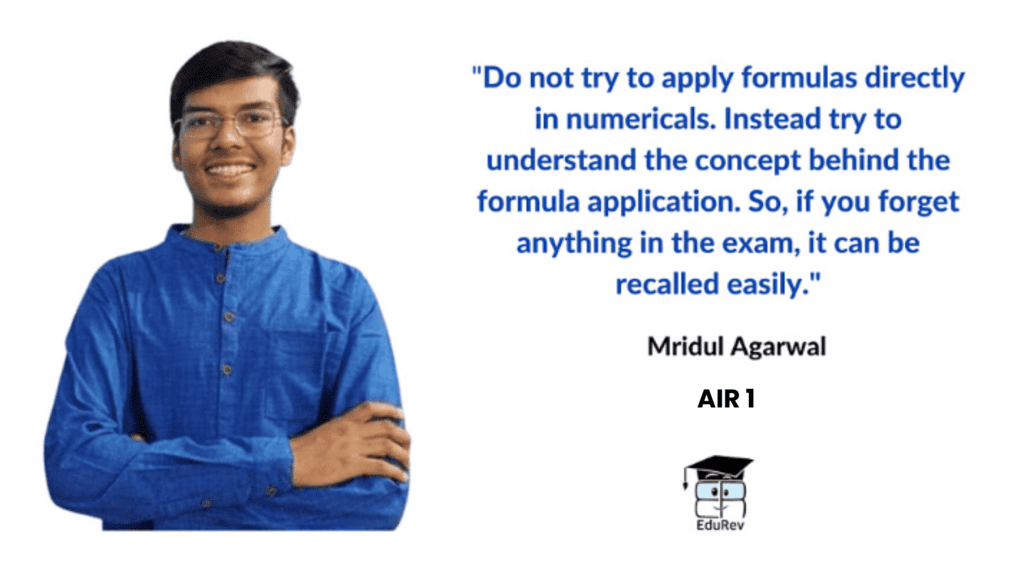
Formulas are not enough for numerical problems: Sometimes numerical problems are designed in such a way that you have to apply conceptual knowledge in order to solve it. Hence only memorising the formulas won’t be enough. here
Chapter-wise Test Practice: While preparing chapters in Physics, give chapter-wise tests as well as topic-wise tests for a better understanding of your weak and strong areas. EduRev has approximately 250+ tests compiled for your complete preparation. For practice, click here.
What to read in NCERT: It is important for you to go through NCERT summary points and points to ponder in blue boxes. Applications given in the NCERT are important to study. NCERT for Physics can be difficult to understand at first, so you can understand the topics from videos or reference books first, and then study them from the NCERT.
Practice Questions
NCERT: Solving NCERT Examples & questions is important as many application based questions come from NCERT. For your ease, EduRev provides all Solved Exemplar and Exercise questions, which are available in each chapter in the course for JEE.
Reference Books: You must practice from H.C. Verma and D.C. Pandey which are very good books for practicing questions from the exam point of view. EduRDev provides questions and solutions for all the chapters of H.C. Verma and D.C Pandey, you can check out H.C. Verma Solutions & D.C. Pandey Solutions for JEE Physics.
Irodov Book can be preferred for some of the important topics for question-solving. Solving Irodov is one of the milestones which most of the students try to cross. You can practice questions of Irodov (with solutions) easily at EduRev; check it out here.
Previous Year Questions (PYQs): After all the question practice, to analyse and practice questions through PYQs of Physics. PYQs can help you to understand the type of questions coming in Physics in the past few years. Solving PYQs will also help you to learn about your weak points so that you can practise the weak points more. If you solve 10-12 sample papers, then you would get information about the pattern of questions and how much time should be devoted to each section. You can practise Previous Year Questions of Physics chapter-wise of the past 35 years on EduRev, check it out here.
Mock tests: Once you have finished the entire syllabus, take full-length IIT JEE mains mock tests. Mock tests are available here.
Flash Cards: Flash cards can also help you to do a quick revision of the important concepts. EduRev has complied flashcards of all chapters of Physics, click here to check.
Daily tests for practice are also available at EduRev. Check out the course Daily Test for JEE Preparation.
For detailed information on How to Prepare for Physics for JEE, you must check out this guide made by EduRev experts. Click here.
Step 5.2: How to Prepare for Mathematics?
EduRev provides complete chapter notes, quality videos, tests, revision notes and so much more on its course mathematics for JEE.
- What to read in NCERT: Firstly, understand all the concepts and solve all the questions from NCERT as NCERT for mathematics is an easier book to solve and it will lay the foundation for your preparation. But only NCERT is not enough to score well in JEE exam. It is important to practice tricky and difficult problems from reference books or tests.
- Memorise formulas: Learning formulas by heart is very important in mathematics. This will save a lot of time. Prepare formula sheets so that you can easily revise them. If you think you might have trouble remembering all of them, you can create a table including the topics and formulas from all the chapters. You should go through it every day. Over a period of time, you will be able to remember all the formulae.
- Chapter-wise Test Practice: While preparing chapters in mathematics, give chapter-wise tests as well as topic-wise tests for a better understanding of your weak and strong areas. EduRev has approximately 200-300 questions compiled in its tests for each chapter. For practice, click here.
- Practice, practice, practice
Important tip: The most important thing to do while preparing for mathematics is to practise as many questions as you can.
NCERT: Solving NCERT Examples & questions is a must. For your ease, EduRev provides all Solved Exemplar and Exercise questions, which are available in each chapter in the course for JEE.
Previous Year Questions (PYQs): PYQs can assist you to comprehend the kind of questions that have appeared in mathematics in recent years and identifying your weak spots. On EduRev, you can practise previous year's questions in mathematics chapter-by-chapter for the past 35 years. For the link, click here.
Mock tests: Once you have finished the entire syllabus, take full-length JEE mock tests. Mock tests are available here.
Reference book: You can also practice from Vikas Gupta which is a very good book for practising questions from the exam point of view. Y
For detailed information on How to Prepare for Mathematics for JEE, you must check out this guide made by EduRev experts. Click here.
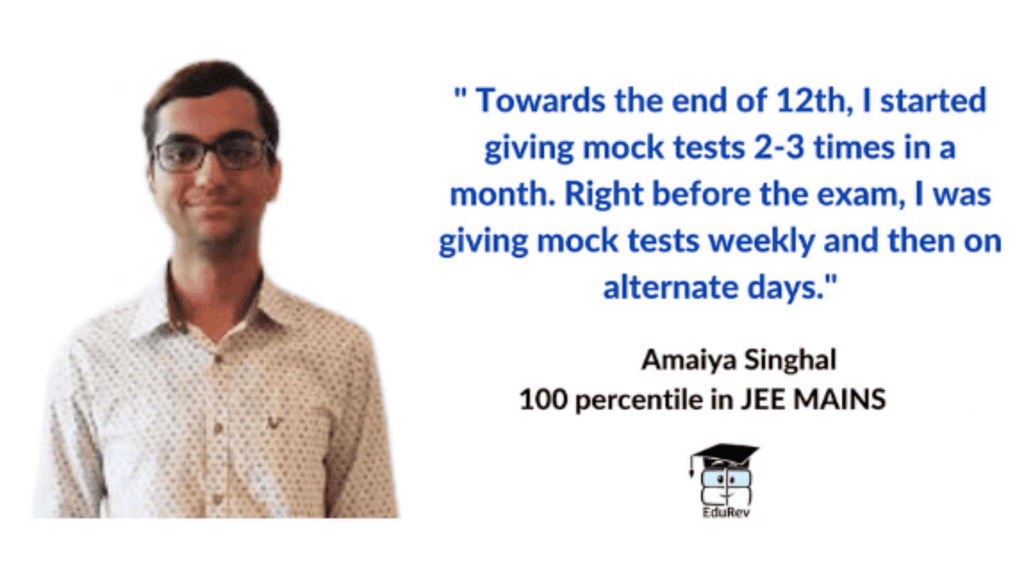
Step 5.3: How to Prepare for Chemistry?
The most important resource to prepare for chemistry is NCERT. It is imperative to study NCERT chemistry line by line. It is also important to study the chemistry lab manual as sometimes some questions may appear to be out of the syllabus but they are actually from the NCERT lab manual. EduRev provides NCERT textbooks, NCERT solutions and NCERT Exemplar in each chapter of the JEE course. EduRev provides complete chapter notes, quality videos, tests, revision notes, mind-maps, formula sheets and so much more on its course Chemistry for JEE.
(i) Organic Chemistry
Start with NCERT: You must cover the NCERT thoroughly and take notes to revise the chapter every now and then.
Named Reactions: In organic chemistry, you need to learn named reactions with their mechanisms.
Understand the mechanisms: Instead of memorising the reactions, try to understand the mechanism of the reaction.
All the reactions covered in the NCERT should be at your fingertips.
Important Topics: GOC, O-containing compounds, isomerism and hydrocarbons are very important topics. These topics must be practised more and more.
Practice test: After studying every chapter, solve the problems to get a better grasp of the concept.
(ii) Physical Chemistry
Solve and practice NCERT Questions: In Physical Chemistry, questions such as numerical questions are really important. You must solve NCERT intext questions and exercise questions properly before jumping onto PYQs.
List of Formulas is important: You must prepare a list of all the formulae and revise them regularly. EduRev has compiled formula sheets for you, click here to check.
NCERT may not serve the whole purpose so you can also refer to some good books like RC Mukerjee and P. Bahadur. These books are available on EduRev.
Do or Die Chapters: Chapters like Thermodynamics and Redox reactions are very important, questions may come directly from here.
Practice tests: After studying every chapter, solve the problems to get a better grasp on the concept.
(iii) Inorganic Chemistry
NCERT is Important: NCERT is more than sufficient for your Inorganic chemistry portion. NCERT must be followed; good questions are framed from it; questions do not come from outside of NCERT; only NCERT-based questions are asked.
Do or Die Chapters: Chemical bonding and the periodic table account for half of the inorganic chemistry syllabus; revise them thoroughly through NCERT. Direct questions are asked from chapters like S and p blocks. You must learn their examples by heart.
Practice tests: After studying every chapter, solve the problems to get a better grasp on the concept.
You can practice Previous Year questions of Chemistry chapters of the past 35 years on EduRev, check it out here.
Chapter-wise Test Practice: While preparing chapters in Chemistry, you can give chapter-wise tests as well as topic-wise tests for a better understanding of your weak and strong areas. EduRev has approximately 200-300 questions compiled in its tests for each chapter. You can practice from tons of questions given in each chapter at EduRev at this link.
Concept Building: For concepts and revisions of Chemistry, you can check out the content on EduRev by clicking here.
Flash cards can also help you to do a quick revision of the important concepts. EduRev has complied flashcards of all chapters of Physics, click here to check.
For detailed information on How to Prepare for Chemistry for JEE, you must check out this guide made by EduRev experts. Click here.
Step 6: Practice, practice, and more practice
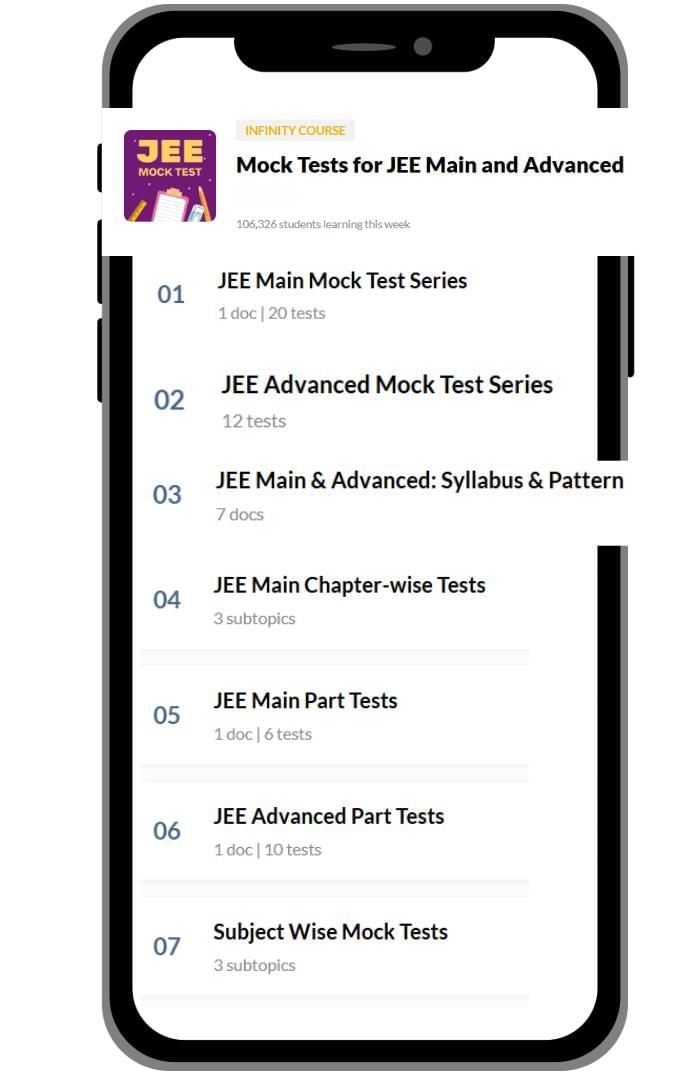
Once you have covered the whole syllabus and you have practiced enough questions, it is time to amp up your revision game. You should start revision at least 2 months before the exam. You should start attempting mock tests for the following reasons.
- Boost confidence: Practising questions makes you confident and gives a real picture of how much syllabus have you covered precisely.
- Time Management: In the JEE exam, managing time is the most vital task and you can not overlook it. Practicing mock tests makes your time management skills stronger. You can practice mock tests on the EduRev platform, by clicking here.
- Makes you Proactive: Mock tests come to the rescue when an exam is on the verge. Mock tests give you a complete feel for the real exam and prepare you accordingly. Mock questions are the most effective way to prepare for an exam. You must check mock tests available on EduRev. Mock tests are available here.
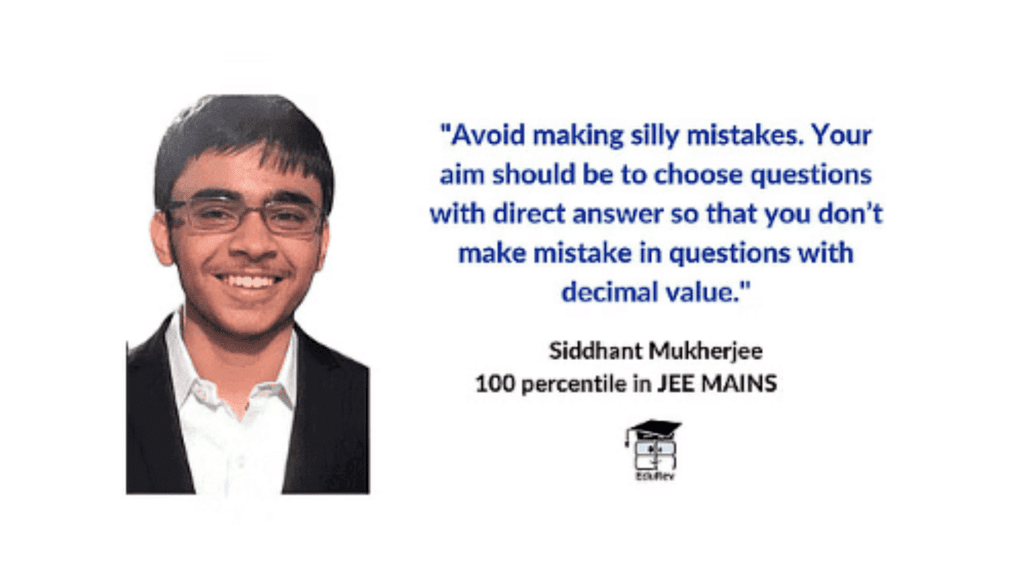
Step 7: Analyse your performance
Analyze the test: After taking a mock test, the most important thing to do is analyze it. It is more important to analyze the test than it is to take the test. Taking a practice test will not help you improve your grades. You must figure out your personal error bandwidth, as well as how many mistakes you made while guessing an answer, how many silly mistakes you made, and how many questions you skipped. You will find the solution if you correct these errors. Every step matters, so consider what you should do to improve your score on the next test.
Look over the solutions: The next step is to thoroughly review the mock test solutions. Surprisingly, after giving a mock test, many students ignore the solutions, defeating the purpose of the test. Don't make the same blunder. Carefully and patiently go over the solutions. While working through the solutions, you will be learning how to apply problem-solving theory, which is a crucial skill for passing the JEE exam.
Step 8: Tips to avoid silly mistakes
Silly mistakes can cost you that seat in your favourite college/university. Therefore, it is important to prevent such mistakes from happening.
- While practising numerical problems, try to avoid silly mistakes by reading the question properly and by noting down the numerical figures properly.
- While practising do not use a calculator as you should build a habit to do calculations on your own. This will improve your calculating speed and accuracy.
- In section B of the exam, you have a choice to select 5 questions out of 10 questions. Select questions which have fewer calculations so that you can avoid losing marks because of calculation mistakes.
Step 9: One month before the exam
- Mocks, Mocks, Mocks – Put Quality over Quantity:
Try to solve mock tests effectively. Don't try to solve numerous questions instead focus on the quality of the questions you solved. After attempting questions, always check for the answers and if your answer is incorrect, understand the answer and see where you were going wrong. - Revisit the formulae - It does help: Revisit the piece of paper where you listed all the formulas and short notes and revise them daily, no matter what! Learn all the basics.
- Revise what you have learned - Do not go for new topics: Now is the time to get better at things that you are already good at and dump the things that you are poor at. Revise the stuff you are comfortable with.
Step 10: One day before the exam
- Stay relaxed- It is important to stay relaxed the day before the exam and to get proper sleep.
- Please check the following as indicated on the Admit Card: Reporting Time at Centre,
Gate Closing time of Centre, Date of Examination, Shift and Timings of Test and Venue of Test. - You should visit the Examination Centre in advance and familiarise yourself with the location and means of reaching the venue of the Test on time.
- On the day of the Examination, please reach the venue of the Test at the Reporting Time mentioned in the Admit Card. If you report beyond the Gate Closing time of the Centre, you will not be allowed to enter the Test venue.
- Eat healthy food and sleep as early as possible.
JEE Preparation Material
- Physics For JEE
- Chemistry for JEE
- Mathematics For JEE
- JEE Main & Advanced Mock Test Series
- How to prepare for JEE
- JEE Bible: 10 Steps to Clear JEE Exam
- NCERT Exemplar & Revision Notes for JEE
- HC Verma and Irodov Solutions
- Subject-Wise Mind Maps for Class 11
- Subject-Wise Mind Maps for Class 12
- DC Pandey Solutions for JEE Physics
- DPP: Daily Practice Problems for JEE
- JEE Revision Notes
- PPTs for JEE Preparation
- Physics 35 Years JEE Main & Advanced Past year Papers
- Maths 35 Years JEE Main & Advanced Past year Papers
- Chemistry 35 Years JEE Main & Advanced Past year Papers
- I. E. Irodov Solutions for Physics Class 11 & Class 12
|
357 docs|100 tests
|
FAQs on JEE Bible: 10 steps to clear JEE by Toppers (ranked under 100) - Mock Tests for JEE Main and Advanced 2026
| 1. What is the best strategy for preparing for the JEE exam? |  |
| 2. How can I effectively use JEE preparation material? |  |
| 3. What role do mock tests play in JEE preparation? |  |
| 4. How important is revision in JEE preparation? |  |
| 5. What should I do if I feel overwhelmed during my JEE preparation? |  |





















